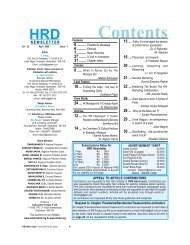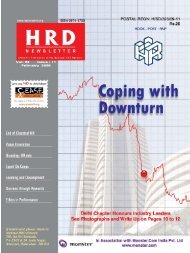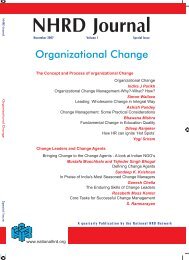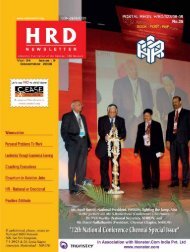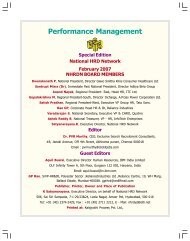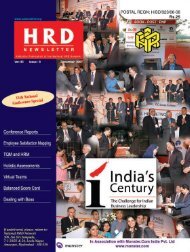5 ........................Chennai Chapter Report 6 ... - National HRD Network
5 ........................Chennai Chapter Report 6 ... - National HRD Network
5 ........................Chennai Chapter Report 6 ... - National HRD Network
Create successful ePaper yourself
Turn your PDF publications into a flip-book with our unique Google optimized e-Paper software.
There has been a shift in the practice of<br />
talent management. The shift is from<br />
talent running after organizations to<br />
organizations running after talent. As a result,<br />
Talent Poaching has become predominant<br />
and the order of the day. Talent Poaching is<br />
the act of enticing key employees from one<br />
competing firm to another. It is the practice<br />
of proactively targeting and hiring top talent<br />
away from a competitor or top firm, with the<br />
specific intention of:<br />
Securing skills or capabilities faster than<br />
if you were to attempt to develop talent<br />
internally through training and<br />
development efforts<br />
Securing expanded capacity (i.e. more<br />
bodies) that will require less ramp up<br />
time and<br />
Mitigating high-level talent losses due<br />
to attrition<br />
I had been personally nagged by a question<br />
whether Talent Poaching is an acceptable<br />
and a healthy practice. I carried out a study<br />
to find answers to these questions. The<br />
study focused on getting the views of Human<br />
Resource Managers on Talent poaching.<br />
Forty eight Human Resource Managers<br />
were interviewed to collect the data for the<br />
study. The respondents belonged to various<br />
business sectors. The respondent<br />
composition of different sectors is:<br />
seventeen from IT & ITES, eight from<br />
Manufacturing, seven from Banking, six from<br />
Services, five from Educational, and five<br />
from Pharmaceutical sectors.<br />
The respondents were asked the<br />
following questions by the author.<br />
1 What are your views on being a<br />
'poacher' and 'poached'?<br />
2 Is talent poaching ethical?<br />
3 What are the merits of talent poaching?<br />
4. What kind of people do online recruiters<br />
or online poachers target?<br />
5 Should 'no poaching agreement' be<br />
considered seriously?<br />
Let us have an understanding or poaching<br />
practices before we take up the discussion<br />
of the data gathered. There are three<br />
dominant Poaching Strategies. They are:<br />
Direct sourcing. Firms use new datamining<br />
techniques and tools, combined with<br />
age-old recruiter phone techniques, to mine<br />
Talent Poaching: Views<br />
the organizational structure, employee<br />
identities, and employee performance<br />
indicators of talent and product competitors.<br />
This competitive intelligence is later used<br />
to determine who specifically should be<br />
targeted for poaching. All work is carried out<br />
internally.<br />
Third-party poaching. This strategy relies<br />
on using a vendor or series of vendors to<br />
identify everything from which firms to target<br />
to what individuals to go after based on your<br />
strategic objectives. It is also by far the most<br />
common way organizations that find<br />
poaching unethical actually practice it<br />
themselves. In their views, poaching is<br />
perceived as unethical only if you do it<br />
yourself.<br />
Attract them with "honey." The third<br />
strategy is the one that a few organizations<br />
would associate with poaching, what is<br />
called "attract them with honey" strategy.<br />
This approach utilizes different channels to<br />
drive candidates to your organization from<br />
other specific organizations, much like<br />
product firms steer you to their products in<br />
grocery stores.<br />
Discussion<br />
It is found from the analysis that talent<br />
poaching is the highest in IT & ITES sector<br />
and the lowest in Banking sector. The<br />
percentage composition of different sectors<br />
is: 50% in IT & ITES, 14% in Services, 11%<br />
in Manufacturing, 10% in Educational, 9%<br />
in Pharmaceutical and 6% in Banking<br />
sectors.<br />
Talented people, 'On being poached', look<br />
for job satisfaction and sense of recognition<br />
besides astronomical salaries. There is their<br />
justification for being poached. Talent<br />
hunters look for, 'on being a poacher', smart,<br />
innovative and co-operative people as their<br />
workforce. There is their justification on<br />
being a poacher.<br />
Employee poaching is accepted as an<br />
ethical practice in this modern business<br />
world as it is next to success and profit. Most<br />
of the respondents expressed that poaching<br />
was not unethical as the practice had been<br />
widely accepted as part of the business and<br />
moreover, every body was at it. For them<br />
the practice is unethical only if employees<br />
move ahead of the bond agreement. It is<br />
also beneficial from both the employer and<br />
employee point of views as the objectives<br />
are personal success on the being poached<br />
and organizational success on being the<br />
poacher respectively. The analysis of the<br />
data (chart-1) shows that 78% of the<br />
respondents expressed that poaching was<br />
R Krishnamurthi is Asst Professor, Jansons School of Business, Coimbatore. Mail: Jckrish@yahoo.com<br />
– R. Krishnamurthi<br />
ethical while 15% the respondents said that<br />
it was unethical and 5% of them were not<br />
sure.<br />
Chart-1 Is Poaching Talent Ethical?<br />
15%<br />
7%<br />
78%<br />
Yes<br />
No<br />
Not Sure<br />
The respondents had their justification for<br />
poaching talent as the practice of poaching<br />
talent has reduced investment on employee<br />
training considerably. This was because<br />
they were able to get the top talent that they<br />
were looking for and the top talents were<br />
equipped with the required skills and<br />
qualities.<br />
It has also been analyzed that top<br />
companies target employees with high IQ,<br />
adaptability, innovation, smart working and<br />
fast learning. Majority of the respondents<br />
were confident that hiring only the confident,<br />
smart and hard working would lead to the<br />
success of a new organization and not mass<br />
hiring.<br />
'No poaching agreement' is merely a fad and<br />
that cannot be followed strictly. By signing<br />
the 'no poaching' agreement, employees are<br />
forced to work with no interest which creates<br />
conflict, time delay in work process,<br />
counterproductive behavior of employees<br />
which further creates an unhealthy<br />
environment inside the organization. That<br />
will force the top management to spend time<br />
and energy in settling disputes. Today's<br />
organizations do not have room for 'fire<br />
fighting'. The top managements have<br />
intelligently understood that by creating<br />
employee engagement, providing extra<br />
allowances like residence, travel, medical<br />
and educational facilities, and maintaining<br />
a smooth relationship with the employees<br />
will help organizations retain their<br />
employees.<br />
Conclusion<br />
From the analysis of the survey conducted,<br />
it is concluded that in today's business world,<br />
employee poaching is considered ethical by<br />
majority of the respondents for it being<br />
beneficial both for the employer and the<br />
employee as both aim for their success and<br />
wealth maximization in a shorter period of<br />
time. The practice can be accepted as long<br />
as employers and employees strictly adhere<br />
to their written agreements.<br />
H<br />
| <strong>HRD</strong> News Letter | April 2008, Vol.24, Issue:1 31




